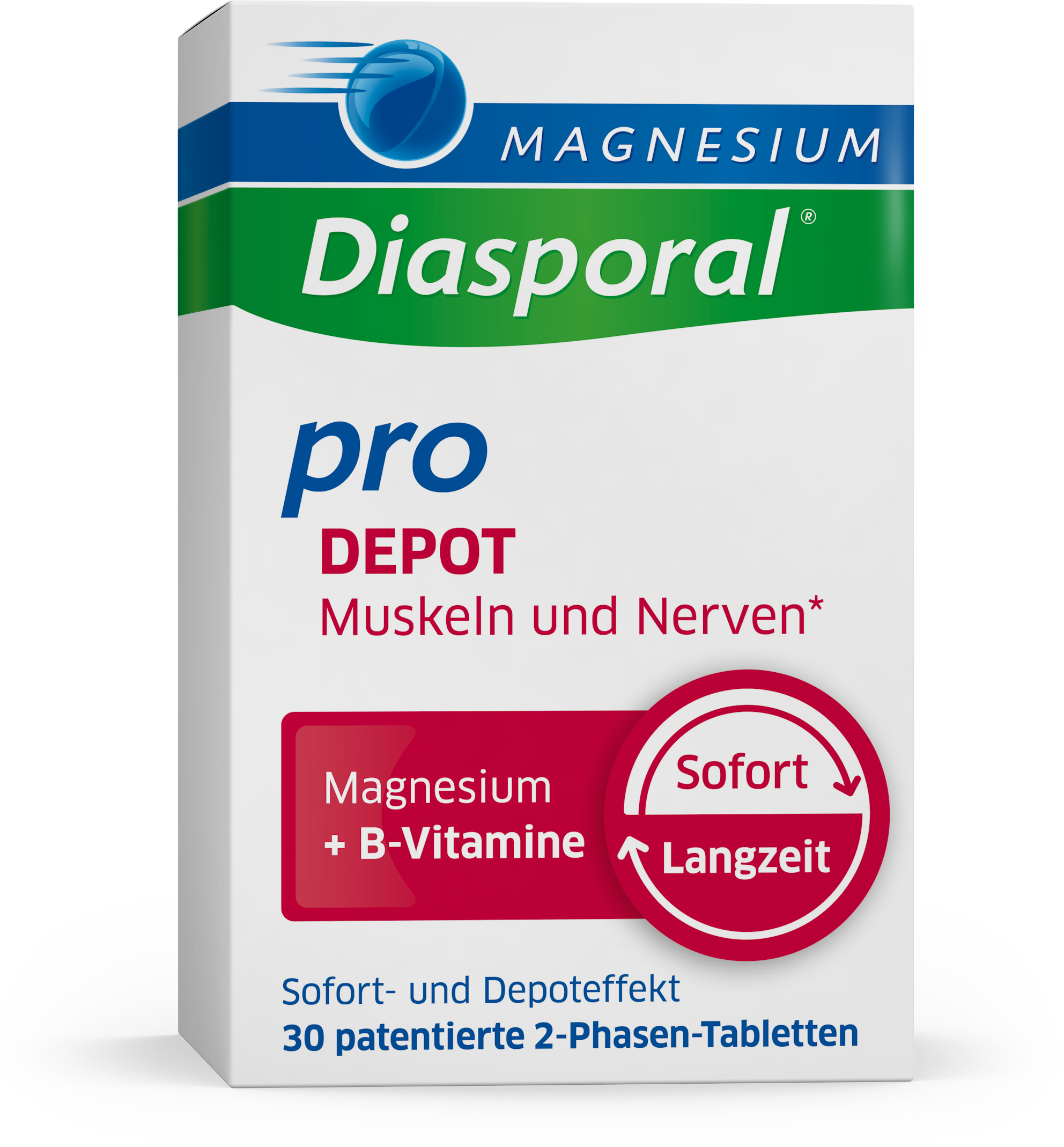
My magnesium requirements for relaxation
MAGNESIUM + B-VITAMINS: HOW THEY CAN HELP US RELAX
When we're relaxed, we go through everyday life with more energy and ease. We are more open to beautiful moments, we perform better and feel happier. But being relaxed and staying that way is not so easy. We need to face challenges at work, care for our families and cope with everyday life. It can be difficult to keep up with these challenges, which leave our nerves and bodies feeling tense. This can have an impact on our well-being and health. It can leave us feeling exhausted and irritable and often causes tension in the neck or shoulder area.
When this happens, our body has an increased requirement for important minerals and special B vitamins, particularly magnesium and vitamins B1, B2, B6 and B12. Magnesium is involved in muscle relaxation, while vitamins B1, B2, B6, and B12 are key to the development, functioning and regeneration of nerve cells.
HOW DOES STRESS OCCUR?
Stress plays an important role in the body. It activates a physical state of emergency that we need in order to produce more energy. This enables us to react quickly to external factors, or stressors (see ""Good to know""). The factors that stress our bodies and nerves can vary widely. The many stresses of everyday life, relationship crises, even noise can affect us in this way. If stress continues for too long, it can place a strain on our muscles and nerves.
Two-thirds of the population suffer from stress at least occasionally, with a quarter of those people experiencing it on a continual basis.
The tension that occurs with stress places demands on our body. Muscle tension, accelerated heart rate and shortness of breath may occur. To cope with these stress reactions, the body requires more of everything: more energy, more minerals and more vitamins.
Stress is triggered by so-called stressors. These can be physical factors, like heat and cold. But they can also arise from a hectic or noisy environment. Common mental stressors include time pressure, unresolved issues, such as financial worries, and social conflicts.
WHAT HAPPENS IN OUR BODIES WHEN WE ARE STRESSED?
To help us to react as quickly as possible to stress, our body goes into high gear. This reaction is triggered by stress hormones, such as adrenaline and cortisol. They cause our blood pressure to rise and our heart rate and breathing to speed up. This improves the oxygen supply to the muscles and the brain.
At the same time, our muscles tense. Stress affects the neck and shoulder area in particular.
WHY DOES THE BODY NEED MORE MAGNESIUM WHEN UNDER STRESS?
When we are stressed, we often experience physical tension. Our muscles contract, sometimes causing painful tension in areas like the shoulders and neck. Since magnesium is involved in muscle relaxation, we need to ensure that we are getting enough magnesium in stressful situations. In addition, higher amounts of magnesium are excreted from the body due to the increased release of stress hormones.
At the same time, it is important for the body to be able to relax again after it has tensed. Following a stress reaction, blood pressure should fall again, and the heart rate and breathing should also slow down. Magnesium is needed for this to occur. This is because the mineral is involved in the regulation of stress hormones. It also reduces the excitability of nerve cells.
In this way, magnesium helps the body transition from tension to relaxation, allowing stress to dissipate. For this to happen, the body needs to have adequate magnesium stores.
HOW DO B VITAMINS HELP WITH STRESS?
B vitamins, including B1, B2, B6, und B12, perform various functions in our body. They help convert food into energy, support the functioning of the nervous and immune systems and contribute to the formation of red blood cells and the regeneration of nerve cells.
More of these vitamins are needed in situations of ongoing stress. This is because the body needs B vitamins to produce stress hormones like adrenaline and serotonin. We therefore need to obtain an adequate supply of B vitamins, especially in stressful situations.
HOW DOES A COMBINATION OF MAGNESIUM AND SPECIAL B VITAMINS HELP US RELAX?
When we're under stress, our body needs more resources. People who often cope with stress in everyday life therefore need to provide the body with sufficient vitamins and minerals. Only then can the body calm down and the muscles and nerves can relax again. Magnesium and B vitamins are essential for this to occur: they each play an important role and work together in synergy.
- Magnesium supports normal muscle function.
- Vitamin B1 contributes to normal energy-yielding metabolism, normal functioning of the nervous system, normal psychological function and the normal function ot the heart.
- Vitamin B2 plays a role in a normal iron and energy-yielding metabolism.
- Vitamin B6 contributes to normal energy-yielding metabolism, normal functioning of the nervous system, normal protein and glycogen metabolism, the normal function of the immune system and normal red blood cell formation.
- Vitamin B12 contributes to normal energy-yielding metabolism, normal functioning of the nervous system and the immune system, normal red blood cell formation and plays a role in the process of cell division.
Magnesium Diasporal® pro DEPOT muscles + nerves patented dual-phase tablets consist of two layers with a fast and slow, continuous release. The short-term phase contains immediately active magnesium and vitamin B2 and B12 for rapid release. The long-term phase contains long-term magnesium and vitamin B1 and B6, which are slowly released over several hours.
*Magnesium supports normal muscle function. Vitamins B1, B2, B6 and B12 contribute to the normal function of the nervous system.

